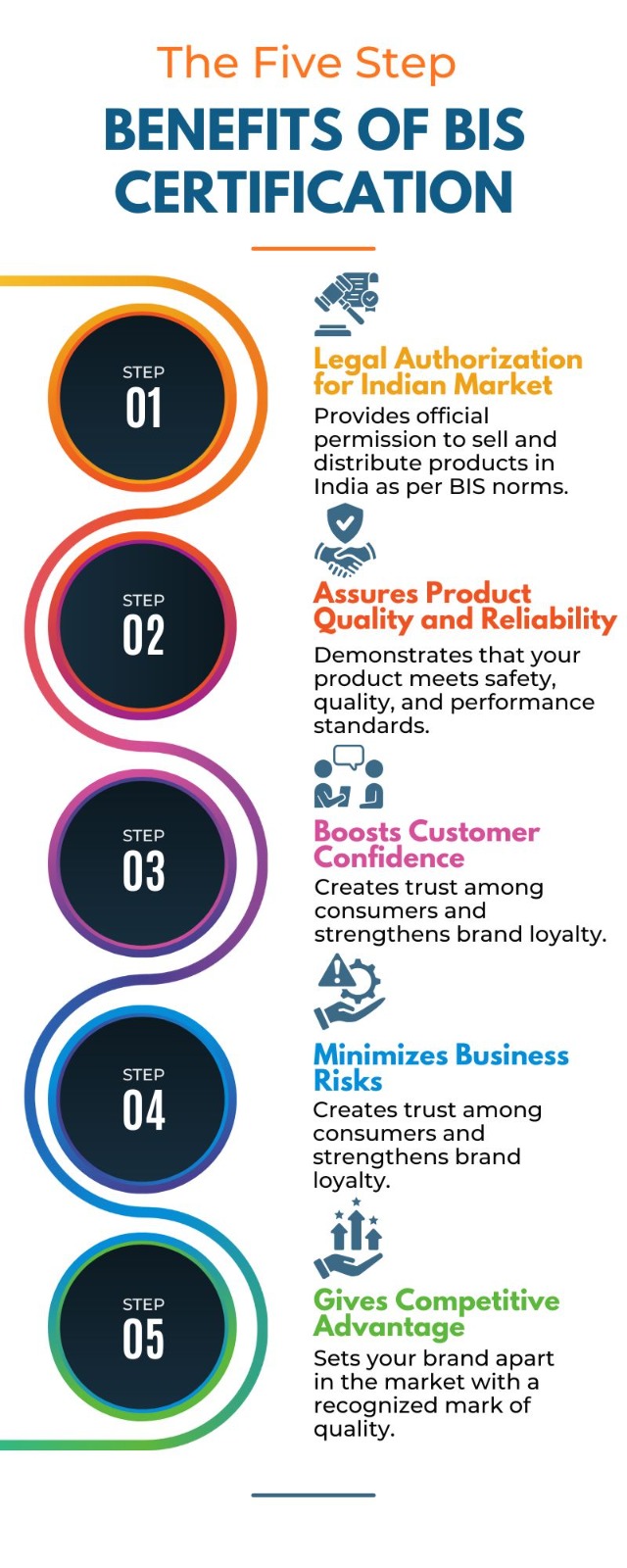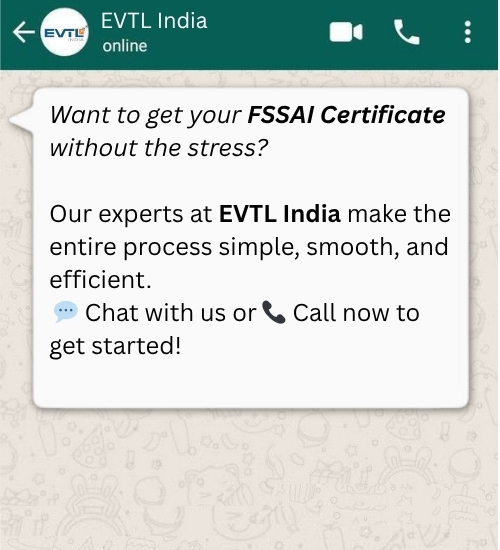Get A Quote
FSSAI Certification / FSSAI Registration & Licence
Looking to obtain FSSAI Certification for your food business in India? EVTL India, a leading FSSAI certification consultant, helps manufacturers, importers, and food business operators secure their licenses with ease. Our experienced team ensures a smooth and compliant process as per FSSAI guidelines, handling everything from documentation to final approval. With timely support and 24/7 consultation, we make your FSSAI certification journey simple, efficient, and stress-free.

Fssai Registration - Overview
Although the food industry is one of the fastest-growing sectors in India, ensuring food safety and quality remains a big challenge. Adulteration, contamination, and the use of low-quality additives are common problems. To protect consumers and ensure that food businesses maintain hygiene and safety standards, the Government of India established the Food Safety and Standards Authority of India (FSSAI).
FSSAI monitors and regulates food manufacturing, storage, packaging, distribution, and sale across India. The main aim of this authority is to ensure that all food is safe for human consumption and that businesses follow the Food Safety and Standards Act, 2006.
WHAT IS FSSAI?
FSSAI stands for Food Safety and Standards Authority of India, an independent body under the Ministry of Health & Family Welfare, Government of India. It was formally established on 5 August 2011 under the Food Safety and Standards Act, 2006.
According to the law, no person can start or operate a food business in India without obtaining an FSSAI license or registration. Every business engaged in food manufacturing, processing, storage, distribution, or sale must get registered with FSSAI before beginning operations.
Types of FSSAI Registration/License
Depending on the scale of business and annual turnover, FSSAI issues three types of licenses:
- FSSAI Basic Registration
- For small-scale food businesses with an annual turnover of up to ₹12 lakh.
- Issued by the State Government.
- Suitable for petty food manufacturers, small retailers, transporters, and distributors.
- Processing time: Around 7 days.
- Validity: Minimum 1 year and maximum 5 years.
- FSSAI State License
- For medium-sized food businesses with a turnover between ₹12 lakh and ₹20 crore.
- The license is issued by the State Government.
- Applicable to manufacturers, storage units, distributors, and retailers operating within one state.
- Processing time: 15–30 days.
- Validity: 1–5 years.
- FSSAI Central License
- For large-scale food businesses with turnover above ₹20 crore or those operating in more than one state.
- Issued by the Central Government.
- Required for importers, exporters, large manufacturers, and central government agencies.
- Processing time: 30–60 days.
- Validity: 1–5 years.
Functions of FSSAI
The Food Safety and Standards Authority of India performs multiple functions to ensure food safety nationwide:
- Setting Rules and Standards : Establishes regulations for food manufacturing, storage, packaging, labeling, and import/export based on hygiene and safety standards.
- Granting Licenses : Issues registration and licenses to eligible food business operators (FBOs).
- Testing Food Quality : Conducts laboratory testing to ensure food products meet prescribed safety standards.
- Conducting Regular Audits : Performs routine inspections of manufacturing units and supply chains to verify compliance.
- Raising Food Safety Awareness : Organizes public campaigns to educate citizens about the importance of consuming safe food.
- Maintaining Records and Data : Keeps detailed records of registered FBOs and their compliance status.
- Updating Government Authorities : Informs government bodies about emerging risks and assists in forming new food safety policies.
Latest 2025 Updates :
- FSSAI has introduced stricter labeling and packaging regulations, mandating eco-friendly materials and full ingredient transparency.
- Front-of-pack nutrition labeling (FOPL) has become mandatory for certain packaged foods.
- Online Food Aggregators (like Zomato, Swiggy, etc.) must ensure that all listed vendors hold valid FSSAI licenses.
- AI-based monitoring and the FoSCoS portal have been enhanced for faster verification and license renewal.
What are the Documents Required for FSSAI Registration?
The list of required documents depends on the license type but generally includes:
Common Documents
- Address proof and photo ID of the applicant
- Proof of possession of premises (rent agreement or property papers)
- NOC from the local body or municipality
- Manufacturing layout and process flowchart
- List of food categories/products to be handled
- Equipment and machinery details
- Brand authorization (if applicable)
- Water analysis report (if applicable)
- Declaration form
- NOC/PA issued by FSSAI
- Contact details of directors or partners
For Manufacturers
- Source of raw materials (e.g., milk, meat, etc.)
- Details of technical personnel involved
- Product testing facility details
For Importers
- IEC (Import Export Code) certificate
- Import license copy
- Storage and distribution details
Procedure for FSSAI Registration
- Document Collection – Gather all required documents based on your business category.
- Online Application – Visit the FoSCoS (Food Safety Compliance System) portal and fill out the application form.
- Submission of Application – Submit the form online and also provide a hard copy (if required) to the local Food Safety Department.
- Application Scrutiny – Officials review the submitted application within 7 working days.
- Inspection (if required) – A food safety officer may inspect your premises before approval.
- Grant of License/Registration – Upon successful verification, the FSSAI certificate is issued with a unique 14-digit registration number.
For Whom FSSAI License is Mandatory in India
FSSAI registration is mandatory for the following categories:
- All food manufacturers and processors
- Importers and exporters of food products
- Wholesalers, retailers, and distributors
- Food storage and repacking units
- Online food delivery platforms
- Caterers, hotels, and restaurants
- Raw food suppliers
- Food transporters and warehouses
No matter how small or large your food business is, you must register with FSSAI before operating legally in India.
Timeline for FSSAI License
| Type of License | Processing Time | Validity |
| Basic Registration | 7 days | 1–5 years |
| Basic Registration | 7 days | 1–5 years |
| State License | 15–30 days | 1–5 years |
| Central License | 30–60 days | 1–5 years |
Renewal:
The validity of the license is 1-5 years depending on the application fee paid. A license must be renewed before 30 days of the expiry of the license.
Conclusion:
The FSSAI license is more than just a government requirement—it’s a trust symbol for your brand. It assures your customers that your food is safe, hygienic, and of high quality.
With frequent updates to food safety laws, such as new packaging norms, mandatory front-of-pack labels, and eco-friendly material requirements, it’s crucial to stay compliant.
At EVTL India, we simplify the process for you. From registration to renewal and compliance support, our experts ensure your food business meets every standard smoothly. Stay ahead of the competition and build a reputation for safety, purity, and reliability with EVTL India — your trusted FSSAI certification consultant.
Our Services
News & Updates









